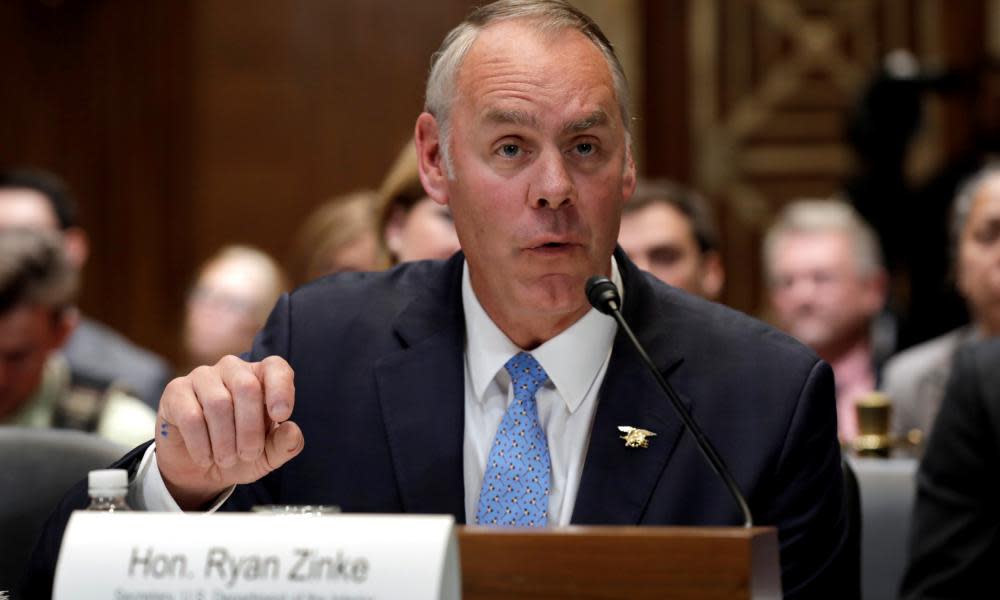Embattled interior secretary Ryan Zinke steps down after series of scandals

Donald Trump’s embattled interior secretary, Ryan Zinke, is stepping down, following a series of scandals in which he is accused of using his position for personal gain.
Trump tweeted that Zinke would “be leaving the administration at the end of the year after having served for a period of almost two years”. Trump added that Zinke had “accomplished much during his tenure” and that a new secretary of the interior would be announced next week.
Zinke becomes the latest official to leave Trump’s cabinet in an exodus following the 6 November midterm elections.
Under Zinke’s leadership, the interior department has sought to advance oil and gas drilling and mining on or near public land, rolled back protections for threatened species and shrunk national monuments.
“Zinke’s days of plundering our lands and enriching himself and his friends are over,” said Nicole Ghio, senior fossil fuels program manager for Friends of the Earth.
“With an average of nearly one federal investigation opened into his conduct in office per month, Zinke’s highly questionable ethics have finally caught up with him. Now, he is just another name on Trump’s list of disgraced cabinet officials, which the Republican-led Congress has failed to hold accountable.”
The Natural Resources Defense Council quipped in a press release that Zinke shouldn’t “let the $139,000 door hit [him] on the way out”. Zinke came under fire for the department’s spending that much to upgrade three sets of double doors.
Gene Karpinski, president of the League of Conservation Voters, called Zinke “the most scandal-plagued interior secretary in recent memory”.
He said: “The damage done by this administration’s anti-conservation policies will not be erased by his departure alone,” noting that Zinke’s replacement would continue to pursue policies friendly to the fossil-fuel industry.
In a statement, Zinke said he was resigning because he could not “justify spending thousands of dollars defending myself and my family against false allegations” but was proud of his record and achievements.
Zinke’s acting successor, David Bernhardt, until now the deputy secretary, is a former energy lobbyist who is expected to pursue fossil fuel development and downplay conservation. Bernhardt will take the role until a permanent replacement is confirmed by the Senate, which could take months.
Brett Hartl, government affairs director for the Center for Biological Diversity, called Bernhardt the “mastermind” behind major efforts at the agency.
“I don’t think anything will change in terms of what’s happening inside interior, although it’s nice Zinke’s gone,” Hartl said.
Bernhardt has acknowledged the science behind climate change but said his job is to consider the administration’s goal of ramping up energy production. Last year he rescinded policies meant to give more weight to climate change and conservation in decisions about public lands.
Joel Clement, a department climate scientist who resigned last year, said this week that Zinke and his staff “sidelined scientists and experts while handing the agency’s keys over to oil, gas and mining interests”.
The Union of Concerned Scientists, where Clement is now a fellow, compiled a report outlining what the group has seen as anti-science moves, many of which will continue under Zinke’s successor.
The department’s internal watchdog last month asked the justice department to investigate Zinke.
Zinke is linked to a real estate deal with the chairman of the oil-services company Halliburton and is accused of blocking Native American tribes from expanding a casino and of redrawing the boundaries of a national monument for political reasons. He also inappropriately allowed his wife to travel with him in official vehicles and invited campaign fundraisers on a government boat tour, according to the watchdog.
In Congress, Zinke would have been a top target of Democrats who won control of the House in the midterm elections and are planning oversight of Trump administration officials.
In a statement, Nancy Pelosi, poised to be the next Democratic speaker of the House, attacked Zinke as beholden to corporate and industry interests and slammed the various scandals that marked his time in office.
“Zinke has been a shameless handmaiden for the special interests. His staggering ethical abuses have delivered a serious and lasting blow to America’s public lands, environment, clean air and clean water.
“Americans are confronted with an administration of unprecedented corruption, cronyism and incompetence, which has shown zero respect for the office or taxpayers’ money,” she said.
Representative Raul Grijalva, the ranking Democrat on the House Natural Resources Committee, said he was hoping for a “genuine turning of the page”.
“Secretary Zinke’s successor has a chance to move on from an unfortunate Trump administration record of environmental mismanagement and decline,” Grijalva said.
Conservatives in Congress have largely supported Zinke. The Republican senator Steve Daines, who like Zinke is a Montanan, thanked Zinke “for restoring common sense management of our public lands, fighting to end the war on coal and for making the US energy dominant”.

 Yahoo News
Yahoo News 
